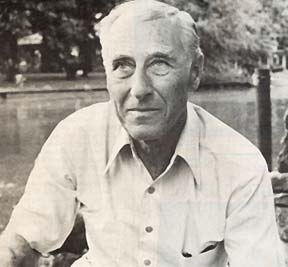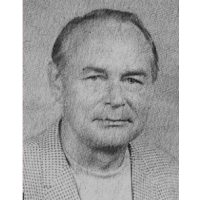1921
-
Speiss, Robert Clayton
 Robert Clayton Spiess
Robert Clayton Spiess(16 October 1921 – 13 March 2002)
“A true haiku is an experience experiencing itself.”
(Speculations by Robert Spiess)
Robert Spiess, editor of American Haiku and Modern Haiku was born on 16 October 1921 in Milwaukee, Wisconsin. After graduation from high school, he enrolled at the University of Wisconsin, in Milwaukee, in 1939 but his plans were interrupted by World War II. He was drafted into the Army Air Force and trained as a cryptographer. Perhaps it was his war experience that helped determine the peaceful path he would follow thereafter. He earned his B.S. degree from the University of Wisconsin, majoring in Botany and English, and then received an M.S., with a major in Vocational Guidance.
Robert became interested in haiku in the late 1930s, through early translations of Japanese haiku.
In the late ’40s and early ’50s he acquired R.H. Blyth’s four volumes of Haiku, and from then on he became hooked on this poetic genre. Robert Spiess published his first haiku in 1949 in American Poetry Magazine, and he became a participating writer. In 1963, he purchased the premiere issue of American Haiku and two of his poems were published in the second issue. A few years later, he accepted the position of poetry editor for that journal.
Robert Spiess’ first collection of haiku, The Heron's Legs, was published in 1966 by American Haiku in Platteville, Wisconsin and over the years he published ten more books. He was also the author of several articles and essays on haiku and his poems have been featured in numerous publications and anthologies. The premier issue of Modern Haiku was published in 1969, and ten of Robert's haiku appeared in the second issue. Within a few years, he was appointed associate editor of that journal. In 1977, he published the first of his "Speculations on Haiku" in Modern Haiku, and in 1978, he became that journal's editor and publisher until his death in 2002.
Robert's countless contributions were integral to the evolution and success of English-language haiku and he was an instrumental mentor in the haiku careers of many contemporary haiku poets.
Books Published:
- The Heron’s Legs (American Haiku, Platteville, Wisconsin, 1966);
- The Turtle’s Ears (Wells Printing Co., Madison, Wisconsin, 1971);
- Five Caribbean Haibun (Wells Printing Co., Madison, Wisconsin, 1972);
- The Shape of Water (Modern Haiku Press, Madison, Wisconsin, 1982);
- The Bold Silverfish and Tall River Junction (Modern Haiku Press, Madison, Wisconsin, 1986);
- New and Selected Speculations on Haiku (Modern Haiku Press, Madison, Wisconsin, 1988);
- The Cottage of Wild Plum (Modern Haiku Press, Madison, Wisconsin, 1991);
- A Year’s Speculation on Haiku (Modern Haiku Press, Madison, Wisconsin, 1995);
- noddy (Modern Haiku Press, Madison, Wisconsin, 1997);
- noddy & the halfwit [with Lee Gurga] (Modern Haiku Press, Madison, Wisconsin, 1999);
- some sticks and pebbles (Modern Haiku Press, Madison, Wisconsin, 2001).
Some awards and other honours:
- In 1988, Robert Spiess was awarded the Haiku Society of America's Special Recognition Award "for a profound, insightful book about haiku".
- In 2000, in Matsuyama, Japan, Robert was presented with the first Shiki International Haiku Award for his achievement in disseminating and deepening the understanding of haiku in English-speaking countries.
- From 2000-2001, Robert was Honorary Curator of the American Haiku Archives.
Selected work:
among these willows:
and breathing the light that falls
from leaf to green leaf(The Heron's Legs, American Haiku, Platteville, Wisconsin, 1966)
*
A drive out of town —
and best of all the billboard
that a wind blew down(Modern Haiku Vol.5:1, 13, 1974)
*
Evening in the park
— and the snow lodging also
in the statue’s eyes(Modern Haiku Vol.6:1, 11, 1975)
*
A couch à la Freud, —
curing souls of sex and things
by which they’re annoyed(Modern Haiku Vol. 6:3, 21, 1975)
*
“Canoeing the Bend” [sequence]
(Modern Haiku Vol.8:3, 12, 1977):canoeing the bend —
a fox in the evening dusk
mouses in a field
canoeing the bend —
a man throwing stones at coots
turns away
canoeing the bend —
motionless, a short-eared owl
watches from an oak
canoeing the bend —
on a sunny ledge of rock
a rattler stirs
canoeing the bend
another bend ahead
thank you
canoeing the bend
in a spit of April snow —
warblers flying by*
a square
of water
re f l e c t s
the moon(The Shape of Water, Modern Haiku Press, Madison, Wisconsin, 1982)
*
ice cubes
aging
in each one's glass(The Bold Silverfish and Tall River Junction, Modern Haiku Press, Madison, Wisconsin, 1986)
*
the field's evening fog—
quietly the hound comes
to fetch me home(The Cottage of Wild Plum, Modern Haiku Press, Madison, 1991); Frogpond 14:4 (1991)
*
wild roses . . .
tarrying beside one
touched by time(From a Kind Neighbor, Haiku Society of America Members’ Anthology 1997)
*
walking for my heart...
so many little karmas
beneath a step(some sticks and pebbles, Modern Haiku Press, Madison, Wisconsin, 2001)
Some essays:
- “Multiple-sense Imagery in Haiku”, Modern Haiku Vol.2:1, 15–16, 1970
- “Notes on Writing Haibun”, Modern Haiku Vol.3:1, 11, 1972
- “The Problem of Originality in Haiku”, Modern Haiku Vol.4:2, 30–34, 1973
- “The Problem of Beauty in Haiku”, Modern Haiku Vol.6:3, 30–32, 1975
- “The Problem of the Ordinary in Haiku”, Modern Haiku Vol.7:2, 16–17, 1976
“A Comparison of Characteristics of English Language Haiku and Senryu”, Modern Haiku Vol.7:3, 30–31, 1976 - “The Problem of Explanation and Interpretation in American Haiku”, Modern Haiku Vol.7:3, 15–17, 1976
- “A Few Notes on the Now-Moment”, Modern Haiku Vol.8:2, 38, 1977
- “The Problem of Reading Haiku”, Modern Haiku Vol.8:1, 30–34, 1977
“Toward a Theory of Fundamental Balance in Haiku”, Modern Haiku Vol.8:1, 39–40, 1977
Sources:
http://www.modernhaiku.org/issue33-3/spiessautobiography.html
http://www.thehaikufoundation.org/poet-details/?IDclient=114
http://www.haikupoet.com/definitions/speculations.html
http://www.modernhaiku.org/MH-Archive/authorsO-S.html#s
http://www.modernhaiku.org/essays/BrooksSpiessHaiku.html
Wikipedia (Russian)
An Interview with Robert Spiess by Michael Dylan Welch at (Modern Haiku Vol.33:3, Autumn 2002) -
Wills, John
 John Wills
John Wills(4 July 1921 – 24 September 1993)
John Howard Wills was born on 4 July 1921 in Los Angeles, California. He received an MA degree from the University of Chicago in 1951, and a PhD from Washington University in St. Louis in 1961. For more than two decades John taught American and English literature at universities in Ohio, Wisconsin, Minnesota, North Dakota, North Carolina, Georgia, and Tennessee and during that time, he published critical essays on T. S. Eliot, Joseph Conrad, and other writers. After the death of his first wife, he married artist and poet Marlene Morelock (now known as Marlene Mountain). They worked together on several haiku projects with him writing the poem and her creating the artwork behind the poem – drawings and photographs.
John’s earliest attempts at writing haiku were made in 1965 after Marlene showed him 'The Way of Zen' by Alan Watts. Actually his earliest haiku writing was influenced by his children's poems. Later in 1968, a colleague gave John and Marlene some back copies of ‘American Haiku’ (which had published its last issue that May). John’s serious interest in haiku began after getting acquainted with the work of Nicholas Virgilio. As he wrote more and more haiku, his skills quickly improved and some early work appeared in 1969 in Haiku West, SCTH, Haiku (Canada), and Haiku Spotlight (Japan). Within that same year, John published his first two books - Weathervanes and Back Country. If one considers the poets publishing in early ‘American haiku’ as the first wave, John was among the second wave of contemporary writers of English-language haiku and some of his earliest work did not follow the traditional rules. He had a very unique style of writing and according to some haiku experts there was a certain iambic meter to his style, almost like a musical flow in his haiku. Encouraged by his wife Marlene Mountain who was one of the first English-language haiku poets to write haiku regularly in a single horizontal line, John wrote some 'one-line' haiku which were later published.
In 1970, John spent the summer studying haiku in Matsuyama, Japan, under a research grant from Georgia Southern College, and in 1971, he moved with his family to Tennessee. They lived on 100 acres in the mountains of Tennessee and named their land "Sweetwater." Much of his best work was written there and he would be called by some the greatest nature poet writing haiku.
By the end of his life, John Wills had published more than 800 haiku and nine books. His haiku were published in journals and anthologies and his work still appears in articles and essays written by a new generation of haiku poets, as well as by his contemporaries who continue to cherish and admire his work. John Wills died on 24 September 1993.
Books Published:- Weathervanes, published by Rhoda de Long Jewell ; (Sangre de Cristo Press, 1969);
- Back Country, photographs by Marlene M. Wills. Partial funding: Georgia Southern College (1969);
- river, drawings by Marlene M. Wills for Georgia Southern College (1970), 2nd ed. Elizabethton, Tenn. (1976);
- The Young Leaves: Haiku of Spring and Summer,drawings by Marlene M. Wills. Statesboro, Ga.: Georgia Southern College (1970);
- Cornstubble: Haiku of Fall and Winter, Photographs by Marlene M. Wills. Statesboro, Ga.: Georgia Southern College (1971);
- 21 haiku greeting cards, haiku by John Wills, drawings/design by Marlene Wills, 1977, self-published, TN;
- Up a Distant Ridge, Manchester, N.H.: First Haiku Press (1980);
- Reed Shadows, Sherbrooke, Que./Windsor, Ont.: Burnt Lake Press/Black Moss Press (1987);
- mountain, S.E. Publishing (1993).
Awards and other Honours:
- Appointed to the first Haiku Society Awards Committee (the Society accepted the committee's recommendations and added awards for Wills' books Back Country and river);
- Served on the first selections panel for Frogpond magazine;
- First Honourable Mention, HSA Merit Book Awards for Reed Shadows;
- John had 21 haiku selected for the 1974 edition of The Haiku Anthology, 36 haiku for the 1986 edition, and 40 for the 1999 edition.
Selected works:
The hills
release the summer clouds
one . . . by one . . . by one(Back Country, Wills J., (1969)
the old field
throbs with insects...
summer moon(Frogpond 8:3 (1985)
autumn wind
the rise and fall
of sparrows(Modern Haiku 18:1 (winter-spring 1987)
the river
leans upon the snag
a moment(Reed Shadows, Wills, J.,Sherbrooke, QC.: Burnt Lake Press, 1987)
dusk from rock to rock a waterthrush
(Up a Distant Ridge (1980); The Haiku Anthology, Van Den Heuvel, Cor, ed. , New York: Norton, 2000, p.301)
in an upstairs room
of the abandoned house
a doll moongazing(The Haiku Anthology, Van Den Heuvel, Cor, ed. , New York: Norton, 2000, p.304)
i catch
the maple leaf then let
it go(from Haiku Mind: 108 Poems to Cultivate Awareness and Open Your Heart by Patricia Donegan, Shambhala Publications Inc, 2008)
More of John’s early haiku at:
http://www.marlenemountain.org/backward/limage/ftm8c_jwillshaiku.html
Some articles, essays and interviews with John Wills:
- Wills, John, "Depth in Haiku," unpublished essay (1974);
- van den Heuvel, Cor, ed., The Haiku Anthology, New York: Anchor Books (1974);
- McClintock, Michael, "A Conversation With John Wills," Modern Haiku 7:2 (1976), 6-8;
- van den Heuvel, Cor, "John Wills and One-Line Haiku - I: A Troutswirl Simplicity", Frogpond 4:4 (1981), 30–33;
- van den Heuvel, Cor, "John Wills and One-Line Haiku – II: One-Liners", Frogpond 5:1 (1982), 38–45;
- van den Heuvel, Cor, "John Wills and One-Line Haiku – III: Three in One or One in Three", Frogpond 5:3 (1982), 38–46 [Correction in Frogpond VI;1 (1983), 45-46;
- St. Jacques, Elizabeth, "The Importance of Rhythm in Haiku," Woodnotes 15 (1992);
- Estevez, Efren, "Images of John Wills," Frogpond XXVII:1 (2004), 55-57;
- Estevez, Efren, "Troutswirl: Art in the Nature Poems of John Wills," The Haiku Society of America Newsletter XXI:4 (2006), 12-13.
Sources:
http://www.marlenemountain.org/mminfo/mi_mmjw_books.html
http://www.thehaikufoundation.org/poet-details/?IDclient=7
http://terebess.hu/english/usa/wills.html
http://performance.millikin.edu/haiku/writerprofiles/RuffnerOnWills.html
https://en.wikipedia.org/wiki/Haiku_in_English
http://www.hsa-haiku.org/frogpond/2010-issue33-2/essay2-miller.html
http://www.modernhaiku.org/essays/RossEssay.htmlThis profile was created in collaboration with John Wills’ wife the poet and artist Marlene Mountain. We appreciate her help in updating the available information on John’s biography and publications!
